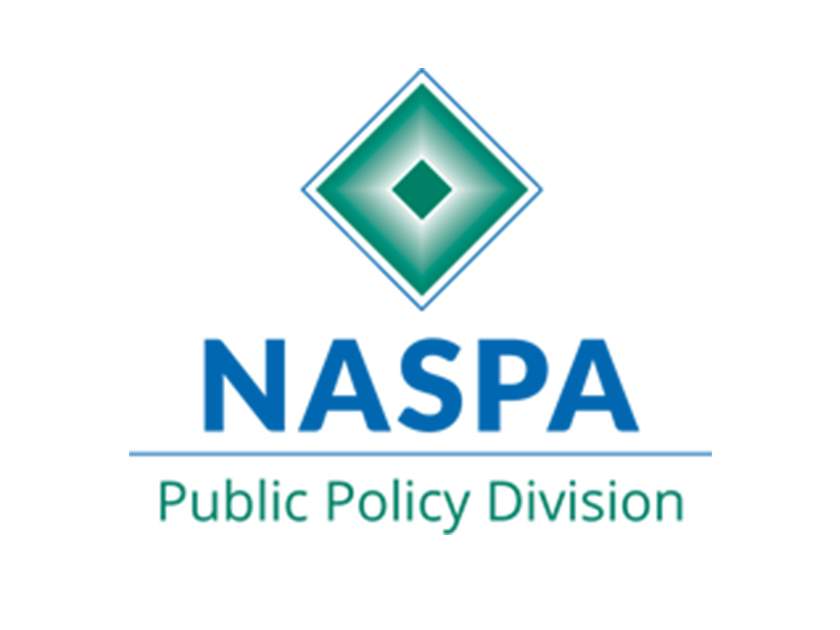Student Success and College Completion
NASPA is committed to supporting public and institutional policies that seek to expand access to high-quality postsecondary education to all students, particularly to those historically under-represented in US higher education. Recognizing that access is only the first of many necessary steps to success, NASPA supports public and institutional policies that create or continue ongoing student support and credential completion, especially those that close equity gaps between historically under-represented and majority groups. NASPA provides leadership in campus and public policy on issues including:
● Documentation and meaningful recognition of prior learning,
● Co-curricular learning,
● Online and blended learning,
● Access to relevant employment during and after credential completion, and
● Dedicated support for adult and other non-traditional students
To create campus cultures committed to student access and completion, NASPA supports policies leading to demonstrated learning and personal and professional growth for students, faculty, and staff.
Student Safety and Wellness
NASPA plays an important role in advocating for student safety and wellness in public policy arenas and helping student affairs professionals to navigate compliance with related legislation, regulations, and governmental guidance on issues ranging from mental health, sexual assault prevention and response, financial stability and literacy, and civic engagement. NASPA is committed to providing student affairs professionals with resources and educational programs that support and promote student safety and wellness in all domains including physical, emotional, intellectual, social, spiritual, occupational, and financial wellness. Student affairs professionals help to create and foster campus environments that are inclusive, safe and supportive of student wellness while simultaneously facilitating the development of skills necessary to engage with a diverse and increasingly global society. Despite recent pronounced efforts to increase mental health services on campus, cultural stigma and limited resources continue to create barriers to equitable access. As new and ongoing court cases continue to revise the minimum required protections for trans students and victims of sexual violence, particular attention to agency directives, state legislation, and court decisions is necessary.
Cost of Higher Education, Student Debt, and Borrower Protections
NASPA is committed to influencing policies that address college affordability, increase access and
availability of financial aid, and decrease student indebtedness, particularly for students from
disadvantaged backgrounds that have had fewer resources to support college preparation and access.
To strengthen students’ and families’ ability to make more informed decisions about their college
investment, NASPA constructively contributes to discussions about measures of accountability and
consumer information. NASPA tracks and provides feedback and support for the design of effective
pathways to postsecondary degrees with particular emphasis on online education, community colleges,
and support for seamless transfer options for students. In all areas, NASPA embraces cost-conscious
approaches to funding and budgeting that focus on student learning, support, and outcomes.
Inclusive Opportunities for Access and Success in Higher Education
NASPA is committed to fostering increasingly more diverse and inclusive campuses that actively support
all students including:
● Domestic students of color
● International, immigrant, and undocumented students,
● LGBTQIA students,
● Students on nontraditional pathways, including adult and formerly incarcerated learners
NASPA provides educational programs and services to help members navigate under-represented
student policy landscapes, especially amid heightened uncertainty regarding protections for
international, immigrant, and trans students. NASPA endeavors to support individuals interested in
becoming involved in advocacy work on their campuses and educating student, faculty, staff, and other
leaders on how to engage in community, state, and national policy dialogues related to more inclusive
practices for under-served populations of students.
Civic Engagement and Freedom of Expression
NASPA is committed to supporting students, student affairs professionals, and others in expanding their
capacity for civic engagement while simultaneously supporting the individual right to freedom of
expression. NASPA recognizes the central role that student affairs professionals play in fostering
democratic campuses that bring together and give voice to diverse people, thoughts, opinions, and
points of view. NASPA seeks to help campuses develop policies that value student concerns and also
protect freedom of speech. Ensuring that all have the opportunity to speak must be balanced with an
understanding of the historic and structural inequalities embedded in our policies. The very real
presence of historical, social, and political power dynamics can neither be ignored nor become the sole
consideration in navigating controversial topics and issues on campus. NASPA provides resources and
information to ensure both the ideals of free exchange of ideas and respect for individual humanity.
